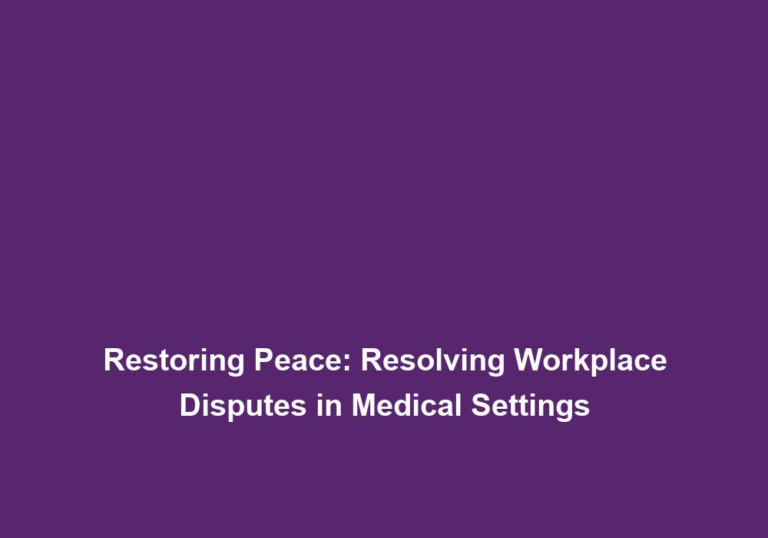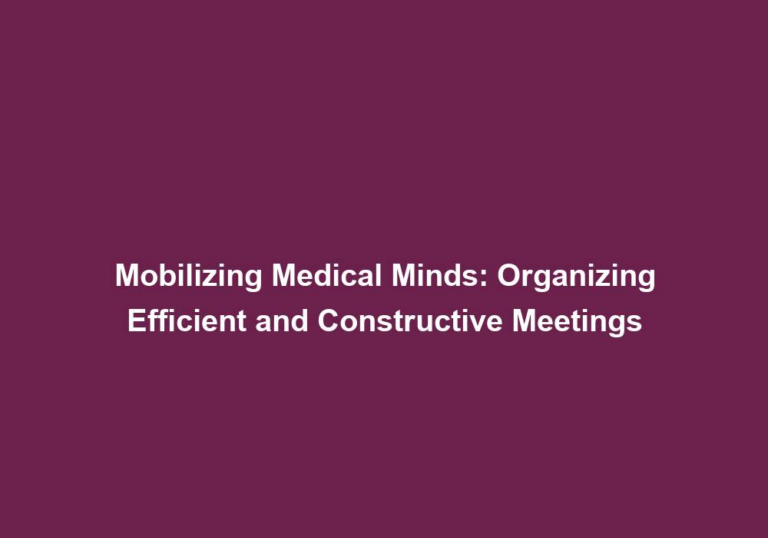Navigating Team Conflicts: Efficient Management Strategies for Clinics
In any professional setting, conflicts are inevitable, and healthcare clinics are no exception. Team conflicts can arise due to various reasons such as differences in opinions, personality clashes, or even external factors affecting the workflow. It is crucial for clinic managers to address and resolve these conflicts efficiently to maintain a harmonious and productive work environment. In this article, we will explore effective management strategies that can help clinics navigate team conflicts successfully.
Understanding the Root Causes of Team Conflicts
Before diving into management strategies, it’s essential to understand the underlying causes of team conflicts in clinics. Some common causes include:
- Communication breakdown: Miscommunication or lack of effective communication can lead to misunderstandings and conflicts among team members. This can occur due to language barriers, poor listening skills, or a lack of clarity in conveying information.
- Clear and concise communication is the key to avoiding misunderstandings and conflicts. Encourage team members to actively listen and provide feedback to ensure that messages are understood correctly.
- Implement language training or interpretation services if language barriers exist within the team.
- Foster a culture of open communication where team members feel comfortable expressing their thoughts and concerns.
- Differences in work styles: Every individual has their own unique work style, and when team members with contrasting approaches collaborate, conflicts may arise. For instance, one team member may prefer a structured and organized approach, while another may be more flexible and spontaneous.
- Encourage team members to acknowledge and respect each other’s work styles. Emphasize the importance of adapting and compromising to accommodate different approaches.
- Establish clear guidelines and expectations for how work should be approached and completed to minimize conflicts arising from conflicting work styles.
- Promote cross-training and job rotation to expose team members to different work styles and foster understanding and appreciation.
- Role ambiguity: When roles and responsibilities within a clinic are not clearly defined, it can result in conflicts. Team members might feel overwhelmed, neglected, or frustrated when they are unsure about their specific job duties or expectations.
- Clearly define the roles and responsibilities of each team member to avoid confusion and conflicts. Provide written job descriptions and update them regularly to ensure clarity.
- Encourage open discussions about roles and responsibilities to address any uncertainties or overlapping tasks.
- Foster a sense of ownership by allowing team members to take ownership of specific tasks or projects, reducing ambiguity and promoting accountability.
- Personality clashes: Conflicts can arise due to personality clashes between team members. Different personalities, temperaments, and values can create friction and lead to misunderstandings or disagreements.
- Encourage team members to develop empathy and understanding towards each other’s personalities. Promote activities that help team members recognize and appreciate their differences.
- Establish ground rules for respectful communication and conflict resolution to prevent conflicts from escalating due to personality clashes.
- Consider personality assessments or team-building exercises to enhance self-awareness and improve team dynamics.
- External factors: Changes in clinic policies, resource limitations, or external influences like patient demands or time constraints can contribute to team conflicts. These factors often create additional stress and pressure, which can fuel conflicts among team members.
- Provide regular updates and training on policy changes to ensure that team members are well-informed and prepared.
- Allocate resources effectively to minimize conflicts arising from resource limitations.
- Foster a supportive environment where team members can openly discuss and address external factors that may impact their work.
Efficient Management Strategies for Navigating Team Conflicts
Now that we have identified the potential causes of team conflicts, let’s explore some efficient management strategies that clinic managers can employ to address and resolve these conflicts:
1. Foster Open and Transparent Communication
Effective communication is the cornerstone of any successful team. Encourage open dialogue among team members and establish clear channels of communication. Regular team meetings, one-on-one discussions, and feedback sessions can help address any concerns or conflicts in a timely manner.
- Create a safe and non-judgmental space for team members to express their thoughts and concerns. Actively listen to their perspectives and provide constructive feedback.
- Utilize various communication tools such as email, instant messaging, or project management platforms to ensure efficient and timely communication.
- Encourage the use of active listening techniques, such as paraphrasing and summarizing, to ensure that messages are understood accurately.
2. Define Roles and Responsibilities Clearly
To avoid role ambiguity, clearly define the roles and responsibilities of each team member. Establishing clear job descriptions and expectations can help team members understand their individual contributions and reduce conflicts arising from misunderstandings or overlapping responsibilities.
- Develop comprehensive job descriptions that outline specific tasks, responsibilities, and expectations for each role within the clinic.
- Regularly review and update job descriptions to reflect any changes in roles or responsibilities.
- Conduct orientation sessions for new team members to ensure that they have a clear understanding of their roles from the beginning.
3. Promote Collaboration and Team Building
Encourage collaboration and foster a sense of teamwork among clinic staff. Engage in team-building activities, such as workshops or training sessions, that promote trust, respect, and understanding. When team members have a positive rapport, conflicts can be resolved more effectively.
- Organize team-building exercises that focus on improving communication, problem-solving, and conflict resolution skills.
- Foster a culture of collaboration by encouraging cross-functional teamwork and knowledge sharing.
- Recognize and celebrate team achievements to boost morale and strengthen team bonds.
4. Implement Conflict Resolution Techniques
Equip clinic managers with conflict resolution skills to effectively address conflicts when they arise. Techniques such as active listening, mediation, and negotiation can be valuable tools in resolving conflicts and finding mutually beneficial solutions.
- Provide conflict resolution training for clinic managers to enhance their ability to identify, address, and mediate conflicts.
- Encourage the use of active listening techniques to ensure that all parties involved feel heard and understood.
- Mediate conflicts by facilitating open discussions and guiding team members towards finding common ground and mutually agreeable solutions.
5. Encourage Employee Empowerment and Engagement
Empower team members by involving them in decision-making processes whenever possible. Actively seek their opinions, suggestions, and ideas to make them feel valued and engaged. When employees feel empowered, conflicts are less likely to escalate, as they are more invested in finding constructive solutions.
- Create opportunities for team members to contribute their ideas and suggestions, such as through suggestion boxes or regular brainstorming sessions.
- Delegate decision-making authority to team members whenever appropriate, allowing them to take ownership of their work and contribute to the overall success of the clinic.
- Recognize and reward individual and team achievements to foster a sense of accomplishment and motivation.
6. Provide Training and Professional Development Opportunities
Invest in the professional development of your clinic staff. Offering training programs and educational opportunities can enhance their skills, promote personal growth, and reduce conflicts arising from a lack of knowledge or competency.
- Identify training needs and provide relevant workshops, seminars, or online courses to enhance team members’ skills and knowledge.
- Encourage team members to pursue certifications or advanced degrees in their respective fields to stay updated with the latest industry trends and best practices.
- Provide mentorship or coaching programs to support individual growth and development.
7. Create a Positive Work Environment
A positive work environment is essential for minimizing conflicts and fostering productivity. Recognize and appreciate the contributions of your team members regularly. Encourage a culture of respect, empathy, and support, where conflicts are seen as opportunities for growth and learning rather than sources of negativity.
- Celebrate individual and team achievements through regular recognition programs or awards.
- Foster a culture of respect by promoting inclusive and diverse practices within the clinic.
- Provide support systems, such as employee assistance programs or counseling services, to help team members cope with work-related stress or personal challenges.
8. Seek External Support if Needed
In some cases, conflicts may persist despite internal efforts to resolve them. In such situations, consider seeking external support, such as professional mediators or consultants specializing in conflict resolution. Their neutral perspective and expertise can help identify underlying issues and facilitate a resolution.
- Engage the services of a professional mediator to facilitate constructive discussions and guide the resolution process.
- Consult with a conflict resolution consultant to gain insights and recommendations tailored to the specific needs of the clinic.
- Maintain confidentiality and impartiality throughout the external support process to ensure a fair and unbiased resolution.
Conclusion
Effectively navigating team conflicts is crucial for maintaining a harmonious and productive work environment in healthcare clinics. By understanding the root causes of conflicts and implementing efficient management strategies, clinic managers can address and resolve conflicts in a timely and constructive manner. By fostering open communication, defining roles clearly, promoting collaboration, and providing ongoing training and support, clinics can create a supportive work environment where conflicts are minimized, and team performance is maximized.
Note: This article is written in markdown format.







